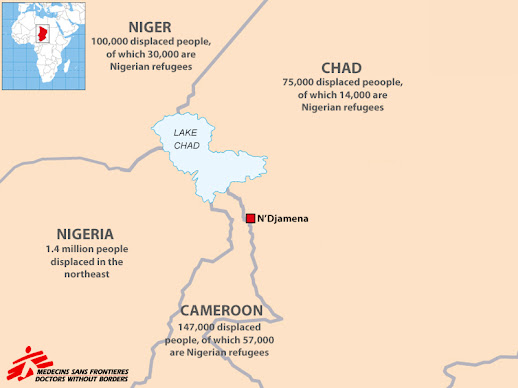Hi guys! This post will examine farming practices in the complex context of the Lake Chad Basin, the changes that have been undertaken in order to cope with the latter and the conflicts as a consequence of political deficiencies.
The Lake Chad Basin’s resources have been central to farmers and herders in the region. Traditionally, food production for the population has been sustained by nomadic herders and pastoralists, which migrated in the region according to the seasonal variations of droughts and floodplains (Zeiba, Yengoh, Tom, 2017). The shrinking of the basin along with the population growth have put a tremendous pressure on the goals of food security, the ambitions of economic and political stability and the livelihoods of farmers and herders.

Two outstanding changing practices have emerged in the current context of increased food and water demand. First, the farming challenges of high dependency to seasonality have been reduced by the use of fertilisers, pesticides and mechanical irrigation pumping systems (Okpara, Stringer, Dougill, 2016). Furthermore, farmers have benefited from the wet silt-rich new lands from the lake’s depletion in order to increase their off-season agricultural production and earn a steady income (Zeiba, Yengoh, Tom, 2017). The second alteration refers to the changing transhumance routes and settlement sites for nomadic herders. Due to the impoverishment of the lake’s resources and the widespread of terrorist activities, the number of settled farms has greatly expanded (Zeiba, Yengoh, Tom, 2017). Pastoral herdsmen are thus confronted with ever-changing itineraries and new settlement patterns around the basin.

Consequently, the shifting farming practices have resulted in the detonation of inter-communities or inter-practitioners conflicts for increased competition over land, water, infrastructure and trade connections (
Zeiba, Yengoh, Tom, 2017/
Okpara, Stringer, Dougill, 2016). Disagreements around land acquisitions, boundaries and occupation by nomadic herders have been widely recorded (
Zeiba, Yengoh, Tom, 2017). Moreover, the Boko Haram-induced migration, evoked in the last post, has also contributed to shaping new transhumance corridors in the region (
Zeiba, Yengoh, Tom, 2017). Not only this has added risks of ethnic clashes and threats of cross-border terrorism, it has extended the tensions over the lake’s resources to inter-state conflicts as illustrated by the clashes over the rights of Cameroonians and Nigerians in the village of Darak (
Zeiba, Yengoh, Tom, 2017).
Herders-farmers conflicts are exemplified by fights over the sharing of grassland and water between farmers and Fulani herders in Nigeria, which has been covered by BBC News since 2009. Tensions have increased over the years because of, first, modern large-scale farming practices leaving few shared spaces for cattle grazing land, and second, the enactment of a legally-binding open-grazing ban since 2017 in various Nigerian divisions (
2016/
2018). A BBC article (
2018) further claims that the latter tensions are turning into a religious conflict between the Muslim Fulanis and the predominantly-Christian farmers. However, it is important to use such media material with caution as journalists tend perpetuate stereotypes when writing about Africa, as pointed out by Wainaina (
2019), by deeply simplifying the multifaceted context of the conflicts and setting up a ‘bloodthirsty’, almost barbaric, portrait of the Fulanis (
2018).
Although environmental, hydrological and demographic factors contribute to conflicts about farming practices, the weak political regulation remains its first cause. First, the management of the lake’s land and resources is shared over village controls (ndoubas), local administrations (bulamas) and illegitimate agents in rebel-controlled territories (
Zeiba, Yengoh, Tom, 2017). Consequently, the rights of farmers and pastoralists are often arbitrary decided upon unjust preferences of ndoubas and bulamas which can be driven by ethnic or economic advantages (
Okpara, Stringer, Dougill, 2016). Furthermore, border areas, especially between Nigeria and Cameroon, have been completely left out of state regulation and responsibility as they are characterised by blurred future and ambiguous jurisdiction (
Okpara, Stringer, Dougill, 2016). Weak land governance has led to a ‘de facto open access’ to uncontrolled land and water misuse (
Zeiba, Yengoh, Tom, 2017). Governments have centred their political actions on military responses and have therefore left the suffering of people, and particularly of farmers, herders and pastoralists, on the side.
The deadly attack of labourers in a rice field near Maiduguri in the Borno state in northern Nigeria last Saturday has direly proved the unstable context of the Lake Chad region. 43 farmers have been killed by Boko Haram jihadists (
2020). The recurrence of such terrible events reflects the daily struggles of farmers, pastoralists and herders whose livelihoods are conditioned by population pressure, climate change, food and water scarcity, conflicts and violence, and changing agricultural practices and needs.
I am not portraying here a region that is 'doomed' or prone to failure (
Wainaina, 2019) but rather, I am demonstrating the urgent need for deep institutional changes in the control and responsibility over the resources around the Lake Chad Basin.
Thank you for reading!






Hi Léa! I really enjoyed this post, especially reflecting to the recent attacks in Nigeria. When you talk about institutional change, do you think there is now a bigger responsibility for states, or international institutions to resolve these conflicts? Or maybe even local communities?
ReplyDeleteThank you for your comment! What I mean is that the current institutional arrangements, spread between ndoubas, bulamas and the State, is deficient in a way that each level of power unilaterally decides of rules and restrictions and pass the buck to the other one when sensible subjects arise. For resource management to be effective, responsibility needs to be better assigned so governmental entities can be accountable for their actions (or lack of thereof). I don't think the State needs to have more responsibilities, it just needs to better delegate power so locals can effectively address their own water issues. This is without speaking of Boko Haram-run regions where international aid is much required for negotiations and humanitarian relief.
Delete